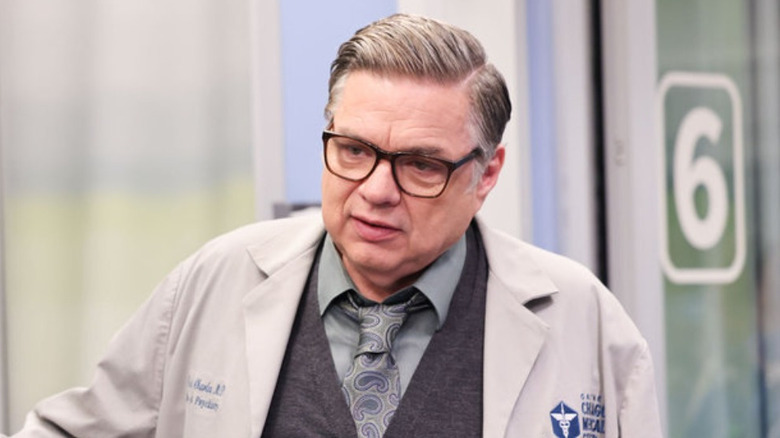Chicago Med's Oliver Platt Explains The Key To Dr. Charles' Character Is His Compassion
Most hospital shows, including "Chicago Med," likely always have to grapple with how to realistically portray the stress and toll of working in a hospital. There is, of course, physical exhaustion, along with the not-insignificant risk of physical injury. But there's also an emotional toll. Given the amount of straight-up devastating deaths that take place in the "One Chicago" universe, it wouldn't be out of line to assume that most main characters have some form of post-traumatic stress to deal with.
This is just one of the reasons the inclusion of Dr. Daniel Charles (Oliver Platt) as a primary character is a wise choice for the series. Yes, Dr. Charles is a doctor like all the others on "Chicago Med," but he is primarily a psychiatrist before all else. Dr. Charles is the Head of Psychiatry at Gaffney Chicago Medical Center and his viewpoint provides fans with a unique window into the psychological side of a hospital's daily demands.
Of course, this comes with its own set of challenges. The trope of the disillusioned shrink is a well-known one, popping up in drama and comedy alike. And Platt has spoken about how, even under his cool and collected exterior, there are very real intimacy issues Dr. Charles faces. That, however, does not seem to get in the way of his ability to keep an open heart at his job.
Compassion is paramount
Speaking with Paulette Cohn of Parade magazine, Oliver Platt said that his primary mode of preparation for playing Dr. Charles was to spend time with actual psychiatrists. "When I was researching the role, I suppose I just hung out with a lot of psychiatrists," Platt explained. "And when I asked, 'What do you think is the most important thing in terms of the transactional relationship between a mental health worker and their patient? What is the thing that is the most important to making it work?' They actually all said compassion."
Platt also discussed how draining the job can be particularly for psychiatrists who work in hospitals, and the need that these same doctors have to protect themselves mentally and emotionally. He elaborated with examples of patients who have come in for the first time, who perhaps aren't even aware that they are experiencing mental health episodes. Platt also mentioned what he called "frequent flyers," patients who are in and out of hospitals because of either the severity of their illness or the myriad shortcomings in the American mental health system.
The emphasis Platt places on compassion isn't surprising for fans of "Chicago Med," as he has spoken about similar character traits elsewhere. In particular, Platt has often discussed Dr. Charles' bravery and acceptance, and even his willingness to open up about himself to patients so that they can accept the care they need. In fact, acceptance was even the subject of Platt's favorite Dr. Charles scene on "Chicago Med."
If you or someone you know is struggling with mental health, please contact the Crisis Text Line by texting HOME to 741741, call the National Alliance on Mental Illness helpline at 1-800-950-NAMI (6264), or visit the National Institute of Mental Health website.

